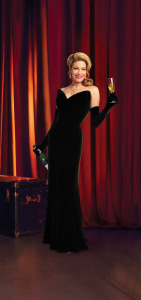
On Broadway: Marin Mazzie Reignites the Role that Landed Dianne Wiest an Oscar
Some dames say “no” when they mean “yes.” Broadway grande dame Helen Sinclair, one of the main characters in Bullets Over Broadway, varies that bit a bit. She says “don’t speak” when she means “full steam ahead.” After inflaming the guy, she douses his passions with protestations of caution and civility and suggests they move to a higher plane. It’s that old stop-start school of foreplay that leaves the object of her affections dizzy with anticipation and confusion.
The Helen Sinclair Technique of Fun, Seduction and Manipulation to Get What You Want may be over the top, but it works. When Dianne Wiest, as Sinclair, applied it to the 1994 film’s protagonist, a novice playwright played by John Cusack, she wound up with a wastebasket full of awards (Best Supporting Actress Oscar included)—plus she pretty much stole that whole picture, which is really saying something when you recall the overstuffed clown car ripping wildly through Woody Allen’s romp of a movie.
With Bullets Over Broadway on Broadway, that sinful Sinclair warranty has been renewed—tuned-up might be a better way to put it—by Marin Mazzie, who has slinked into the role for the production, adapted by Mr. Allen himself from the Oscar-nominated script he and Douglas McGrath wrote. That it sits onstage, jokes and all, full of fully delineated, genuinely funny characters shouldn’t come as a surprise. Mr. Allen has done more Oscar-nominated screenplays than anyone, even Billy Wilder.
“I always thought it would make a great musical,” Ms. Mazzie said in a recent interview. “These characters are so broad-stroked and broad-based that the fact they now sing isn’t so unbelievable. In fact, it makes sense—the way Woody has adapted the book and the placement of the songs and, of course, the songs he and Stro [director-choreographer Susan Stroman] have chosen. Most of them are in public domain—all popular jazz songs from the ’20s—so our music supervisor, Glen Kelly, has been able to write new lyrics that are a bit more character-specific. It’s not a jukebox musical in the sense that there are 20 tunes thrown in for no reason. These are really there for a reason, and, together, they make a very cohesive score.”
It’s the kind of score you can go into the theater humming—except that some care has been taken to keep specific titles under wraps so they might come upon you unawares, as it were. It’s a delicious mix of the known and the not. For every “Let’s Misbehave” or “Runnin’ Wild,” there’s a “Gee Baby, Ain’t I Good to You” or “Blues My Naughty Sweetie Gives to Me.” The real beauties are the lesser-known ditties that behave like real songs and serve the needs of the character or the situation.
“I know Woody didn’t want anybody to write a score,” said Ms. Mazzie. “He didn’t think anybody could write a score that sounds like what this is—that true period music—and he was right. The fact he and Glen and Stro were able to take the old songs and mold them so that they fit the characters creates the illusion of a score.”
Ms. Mazzie lords majestically, luminously, almost benevolently over this oddly compatible mash-up of mobsters and muses. She’s in the queen-bee slot but not so queenly that she would sacrifice her supporting-award status. No, the star of the show, she insisted with a resolve that may have broken her teeth, is Zach Braff as that novice playwright. If he lingers longer in her front yard than others, that’s his red wagon. He represents the eyes of the audience, and she’s just one of the colorful crazies he encounters along the way.
Mr. Braff, a virgin to Broadway and musical comedy, is also the perfect Allen facsimile for the real thing—all thumbs and fumbles, nerdy intellect, clumsy libido—and he wears a wildly unruly Clifford Odets hairdo so you know he’s an earnest playwright.
“Everybody has a really great turn here—all nine of us,” said Ms. Mazzie. “You know who everyone is in this show. It’s really a feat to do that with so many principals and still tell the story well. The beauty of this show is that these characters are really fun and interesting.”
As one cog in this comedy machine, she spoke admiringly of the others. “I love what Helene Yorke is doing with the Olive character, and Nick Cordero is a wonderful Cheech.” She is the mob boss producer’s talent-free girlfriend who weighs a ton on the show, and he’s her bodyguard, a hit man who turns into a hit-maker, suddenly emerging the dramaturge who keeps Mr. Braff on the right track. “Cheech discovers his Inner Artist, which, the way it plays out, is funny and tragic at the same time. The whole question of how far you can go for your art, how much you can compromise for it, is something every one of our characters must cope with, one way or another.”
And nobody more so than Helen Sinclair. “The decision to do the play is her big compromise,” Ms. Mazzie said. “This play is offered to her, and she’s asked to play a frump whose husband has left her. Helen Sinclair has never played such a role in her life—nor would she think anyone would even dare to ask her to—but she hasn’t had any roles for a few years. She’s better known as a drunk and an adulteress. She’s at this point in her career where she has to make that decision. Is it better to do a play you don’t believe in and take a role you don’t want? At least, it’s something, and it’ll get her back. Because she is who she is, she takes the part—but only so she can manipulate the author into writing her a much bigger, better, more beautiful role.”
Evidently, no one has told her she’s a down-and-out diva, because she looks every inch a star—to be specific: a prime-time Arlene Dahl. Paul Huntley has banished the blondeness that has been Ms. Mazzie’s trademark from the beginning and crowned her with a strawberry-red wig. He wanted her “more on fire,” because she talks like that.
And William Ivey Long hasn’t costumed her as much as he has gift-wrapped her in a dozen or so outfits so outlandish you almost laugh at first sight (the see-through Jean Louis imitation, the black-and-white Art Deco homage to Anthony Powell, et al).
“I love her bearing,” gushed Mr. Long. “She’s the best—great posture, carriage. When I thought of Helen Sinclair, I thought of those recently restored statues on the side of the I. Miller Building at Broadway and 46th at the base of the Actors’ Equity building [America’s “best-loved actresses” of 1927: Ethel Barrymore, Marilyn Miller, Mary Pickford and Rosa Ponselle]. Helen Sinclair should be up there, standing in a niche.”
Given her proclivities, a stoned Helen Sinclair isn’t far off the mark. “Don’t speak.”
By :Harry Haun,( Posted on: The Observer)












